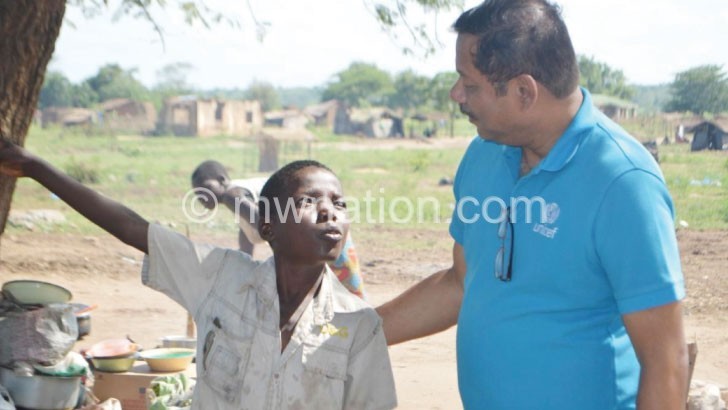Small steps to recovery
How are children and families coping with floods which have affected 184 000 and killed about 60 people in the Southern Region? Unicef Malawi communications officer RABECCA PHWITIKO writes.
On the weekend of March 9-10, few weeks before maize in Malawi was due for harvest, heavy rain swept away crop fields and thousands of houses, cutting off access to some areas and killing 56 people.

Gasiano, 12, at Mwalija camp in Chikwawa
Two weeks on, over 93 000 families, including about 460 000 children, lack food, water, toilets and other basic supplies.
Eneless Bernard, 36, didn’t have much before the floods hit. Now the little she owned is gone.
“I came here with a bucket, two plates and the clothes I am wearing,” says the mother of five.
Three of her children are in school, while the two youngest are four and three years old.
It is 1pm in Chikwawa District, where the heat is as harsh as the rain that has forced Eneless and thousands of others out of their flooded villages.
The women chat and occasionally get up to tend to their pots some two meters away.
Everyone is cooking the same meal. Pots of beans are lined up on about 20 fires outside a classroom at Chagambatuka Primary School, which has been their home for about a week.
The population staying in the school fluctuates, but camp chairperson, elected by the villagers, estimates that there are 2 100 people in the camp.
A few families have moved out to stay with relatives. In the afternoon, most of the men go off to try to find work while the older men stay in the camp along with the women and children. Some families are trying to rebuild their destroyed houses where the water has receded. By evening they all return to sleep in the classrooms.
Eneless and her children sleep in the Standard 5 classroom.
“In the morning we move our belongings to Standard 4 classroom which is our storage room,” she explains.
The school has 14 latrines for 756 pupils. Now the displaced people are using these as well.
“We take turns to clean the toilets, but there are too many of us using them. Yesterday some people from the district hospital came to clean the toilets with chlorine. I hope they come again,” says Eneless.
Chlorine, along with portable latrines, soap, buckets are some of the critical emergency supplies that Unicef is bringing to camps to assist communities displaced by the floods.
The story is similar in almost 200 other sites across the 14 affected districts, including the neighbouring Nsanje, at the southern tip of Malawi. Displaced families are camping in schools, churches and any other buildings open to the public and still standing.
Some 50 kilometres from Nsanje Boma, about 4 700 people are camping in a big market shed with just a roof for shelter.
Isaac Falakeza, the camp manager at Bangula Agricultural Development and Marketing Corporation (Admarc) depot, says they have no water in the camp and had no latrines for the first few days.
By the fourth day, they had six latrines, but these were still not enough for 4 700 people. They sleep in overcrowded and unhygienic confinements.
“I was happy to be rescued and brought here after our house collapsed in the middle of the night. We waited hours in our wet clothes for help to arrive. But now I want to go home,” says Funny Kalitsero, 14, fanning away mosquitoes in her crowded place.
The sad reality is that Funny and many others will not go home anytime soon.
Unicef’s priority is to quickly help children and their families live as comfortably as possible while they are in the camps. Unicef has delivered mobile toilets, soap, buckets and disinfection kits to camps like these. Bangula now has six additional toilets, thanks to Unicef. The children’s organisation is also distributing insecticide-treated bed nets and recreational kits for children.
“After a disaster like the recent floods, Unicef’s priority is to help children and families who have lost their homes and are living in evacuation centres or with other families in their communities,” says Unicef Malawi representative Johannes Wedenig. “We have emergency supplies pre-positioned in areas that are regularly affected by natural disasters, which has allowed us to move quickly to meet people’s immediate needs.”
Most of the displaced children have not yet returned to school. Around 2 000 children are staying at Bangula Admarc camp, which is near a primary school. Given additional resources, the school can absorb some of the children.
Unicef has trained and deployed volunteer teachers and is dispatching tents to be used as temporary classrooms, as well as school kits which include chalkboards, notebooks, pen and pencils.
This provides relief for children like those of Eneless—Funny, Lincy, Stella, Gift, Sautso and Martin. For them, the worst of the rains and floods is already over. However, they face weeks or months of further disruption to their lives and education.
With support from Unicef and others, hopefully they will be able to get back to normal as soon as possible.





